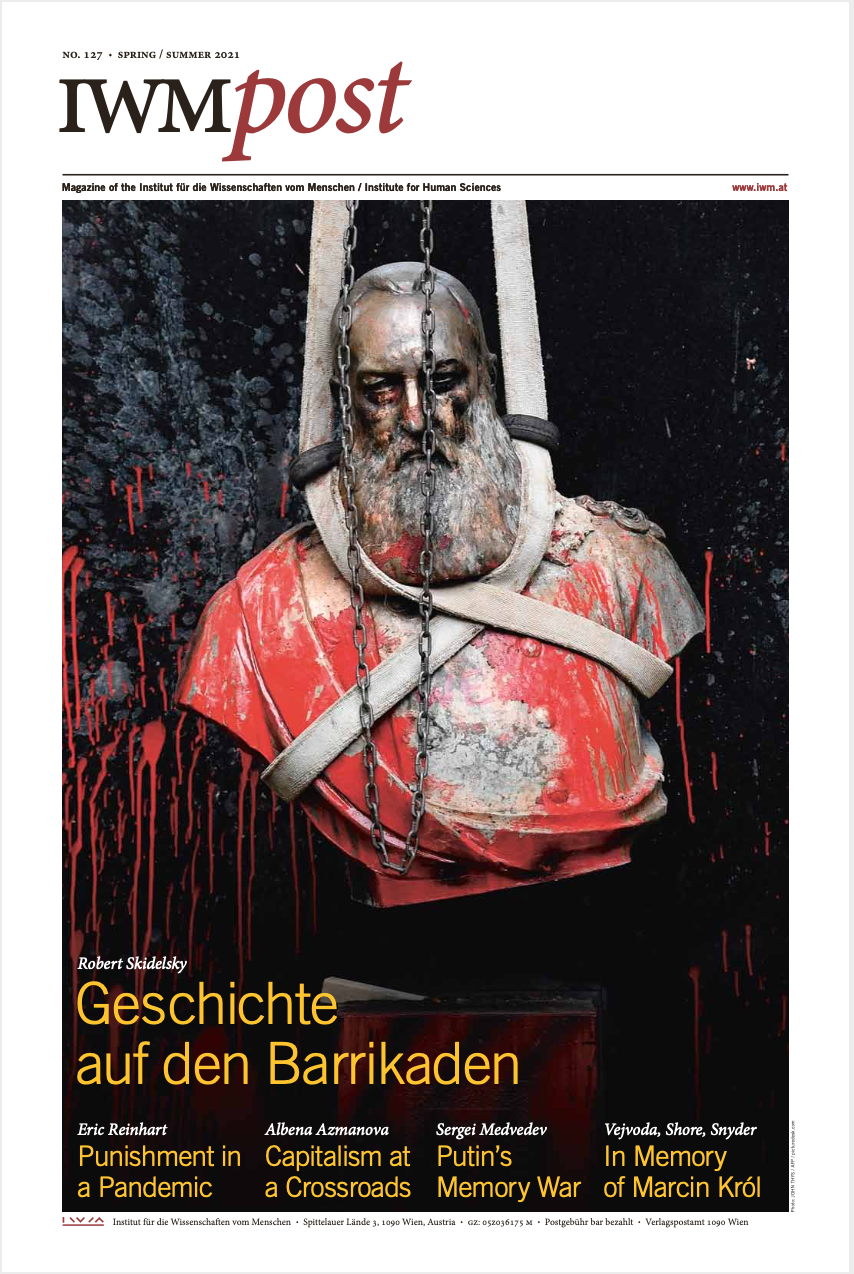The cover of this issue shows a statue of King Leopold II of Belgium in Ghent that was smeared with red paint and removed just as the country was about to celebrate the 60th anniversary of Congo’s independence. Attacks on statues have become a typical expression of protest against a hegemonic narrative of history and the ubiquity of its symbolic representations. They demonstrate that history has become the central terrain of contemporary political struggles.
“History and memory” make up the central focus of this issue. Robert Skidelsky illustrates how questions of interpretation and positionality have pushed the claim of objective reconstruction of the past into the background in the mainstream understanding of history. The other essays in this focus address the official politics of memory (Sergei Medvedev, Nikolai Antoniadis), the difficulty but also the need to confront the unpleasant aspects of one’s own past (Teresa Reiter, Jerko Bakotin), the problems of critical historians in authoritarian regimes (Felix Ackermann) and the function of memorial sites and monuments (Iryna Sklokina).
Three essays shed light on the severe consequences of the pandemic among socially vulnerable groups such as migrants and prisoners (Giorgia Donà, Paula Banarjee, Eric Reinhart). Questions raised by the pandemic were also addressed in two debates in our discussion series “Debating Europe” at Vienna’s Burgtheater, reported on in this issue.
A number of essays address contemporary capitalism. Excerpts from texts by Branco Milanović and Mariana Mazzucato introduce a forthcoming IWM volume on capitalism in the 21st century. Furthermore, Albena Azmanova highlights the importance of precarity for contemporary capitalism, while Pedro Perfeito da Silva discusses the capitalist revolt in Brazil that went along with the rise of Bolsonaro.
The other contributions deal with current challenges to liberalism (Judy Dempsey, Michael Igantieff), discuss aspects of Russia’s and China’s relationship to the West and the international order (Volha Biziukova, Thomas Eder) and honor Marcin Król, a long-time friend of the IWM who sadly passed away last November (Ivan Vejvoda, Marci Shore, Timothy Snyder).
I hope you enjoy the read.
Evangelos Karagiannis
Download IWMpost 127 as a PDF
Contents
Covid-19 and Social Vulnerability
Immigration Policies and Public Health Responses to Covid-19 / by Giorgia Donà
The Pandemic Tale: A Dangerous Time for Migrant Women in South Asia / by Paula Banerjee
Punishment in a Pandemic / Eric Reinhart in conversation with Salmaan Keshavjee
Pandemie im Diskurs / Burgtheater-Debatten
Capitalism
Kapitalismus im 21. Jahrhundert / von Mariana Mazzucato und Branko Milanović
Capitalism at a Crossroads / by Albena Azmanova
Bolsonaro and Brazil’s Capitalist Revolt / by Pedro Perfeito da Silva
History and Memory
Geschichte auf den Barrikaden / von Robert Skidelsky
Was ist politisch am 18. Jahrhundert? / von Felix Ackermann
Europa kann sich seine Vergangenheit nicht aussuchen / von Teresa Reiter
Putin’s Memory War / by Sergei Medvedev
Holy Places and Leisure Spaces / by Iryna Sklokina
The Moral of the Dvor Massacre / by Jerko Bakotin
Sie sollen sich erinnern, wen sie vergessen sollen / von Nikolai Antoniadis
Challenges for Liberal Democracy
Poland’s New Transformation via Legal Impossibilism / by Judy Dempsey
Can Liberal Democracy Outlive Climate Change? / Podcast with Michael Ignatieff
China, Russia, and the West
Condemning ‘the West’ and Redrawing the Realm of the Political in Russia / by Volha Biziukova
China’s Distinct Path to Engaging International Courts / by Thomas S. Eder
Marcin Król
In Memory of a Friend / by Ivan Vejvoda, Marci Shore and Timothy Snyder
Impressum
Editor: Evangelos Karagiannis
Editorial Assistance: Nicolas Bouchet, Katharina Hasewend, Sarah Hayes, Anahita Neghabat, Katherine Younger
Design: steinkellner/zotter, www.steinkellner.com
Printed by Print Alliance HAV Produktions GmbH, 2540 Bad Vöslau.
IWMpost is published two times a year.
Copyright IWM 2021
